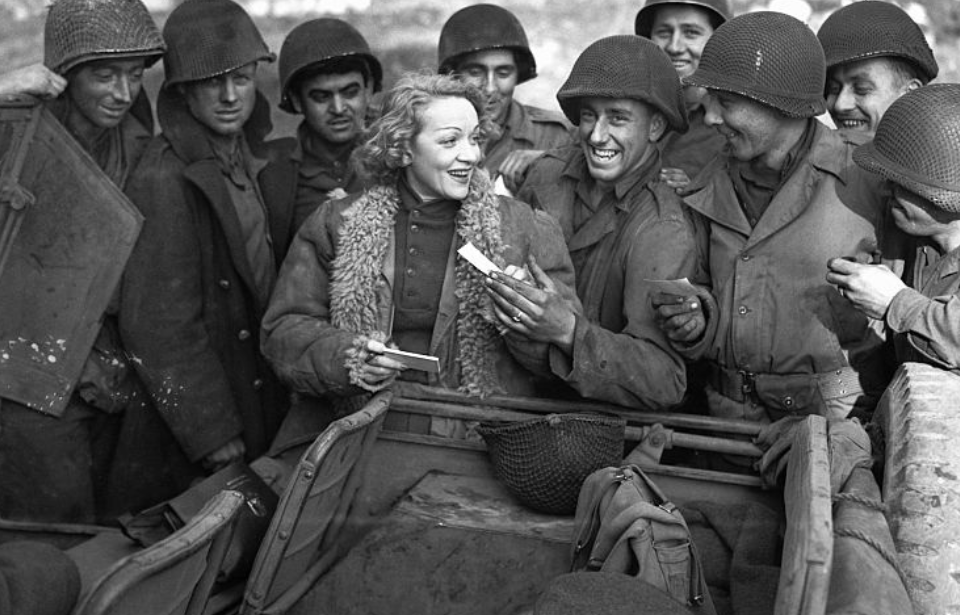German actor Marlene Dietrich was one of the most famous faces of Hollywood’s Golden Age. Moving to the United States after her breakthrough role in The Blue Angel (1930), she wowed audiences with her on-screen abilities, as well as her stage shows. Unable to sit back and watch things play out during the Second World War, she dedicated herself to the war effort, raising funds via war bonds, putting on performances with the USO and working with the OSS.
What’s more, she even wanted to be involved in a potential assassination plot against the Führer.
Refusing to star in German propaganda films
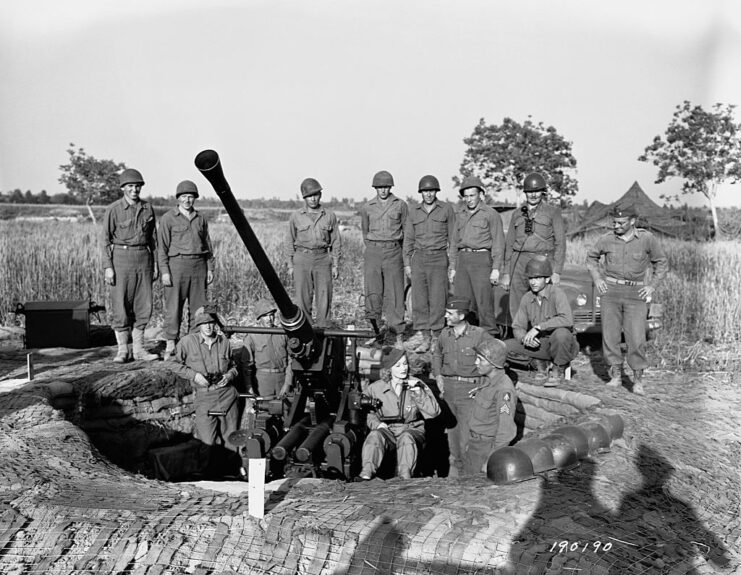
Prior to the outbreak of the Second World War (dates vary), Marlene Dietrich was approached by German agents, who had the intention of having her star in propaganda films. The actor, who was staunchly against the regime, refused, which angered the Führer, who had allegedly hoped she’d also become his mistress.
Upon her refusal, Dietrich was accused of “consorting with Jews,” and her films were subsequently banned. All but one copy of her most popular feature, The Blue Angel, were destroyed, with the Führer in possession of the only surviving one, as it was his favorite movie.
By 1939, Dietrich had renounced her German citizenship and applied to become an American, which further angered the regime. She was deemed a traitor, which didn’t bother her too much. In fact, in later wartime radio broadcasts, she spoke out against the country’s leadership and called the Führer “an idiot.”
Marlene Dietrich promoted the sale of war bonds
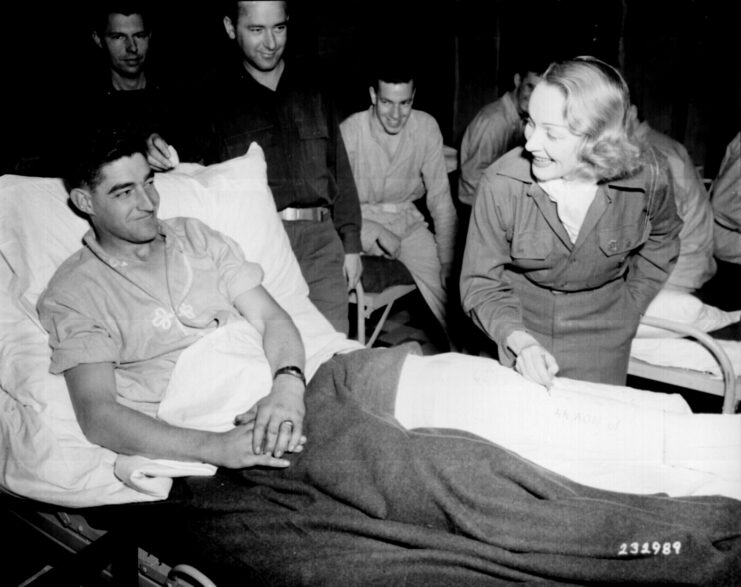
When the United States entered World War II after the Japanese attack on Pearl Harbor, Marlene Dietrich immediately threw herself into doing whatever she could for the war effort. She was one of the first celebrities to go on a war bond tour, appearing before an estimated 250,000 American troops during the Pacific leg of her trek alone.
Dietrich toured the country from January 1942 to September ’43, with it estimated she alone raised over $1 million. She also sold the most war bonds out of any other Hollywood celebrity – an impressive feat.
J. Edgar Hoover’s suspicions…
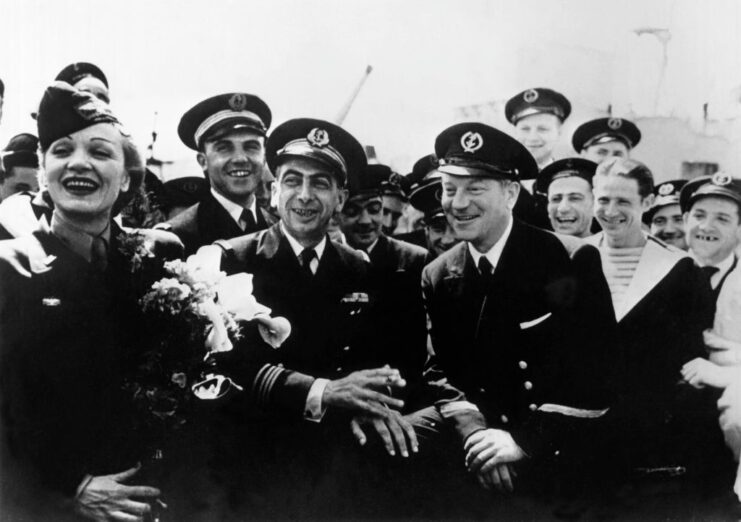
Despite her speaking out against the regime, Marlene Dietrich couldn’t escape suspicions that she was a German spy. J. Edgar Hoover, director of the Federal Bureau of Investigation (FBI), was among those to suspect this, largely due to an immigration application she’d submitted for her then-lover, Frenchman Jean Gabin.
From 1942-44, FBI agents tailed Dietrich and intercepted her communications, with the aim of trying to capture her in the act of betraying the United States. Her every move was documented, and it was eventually concluded that she wasn’t involved in “anti-American” activities. If anything, all the agents had learned was a bit too much about her love life (their words, not ours).
In an unexpected turn of events, given Hoover’s mistrust of her, Dietrich actually became a spy for the US. She became a special service contact, charged with “collecting observations about subversive activities in Europe” while touring with the USO.
Marlene Dietrich toured with the USO
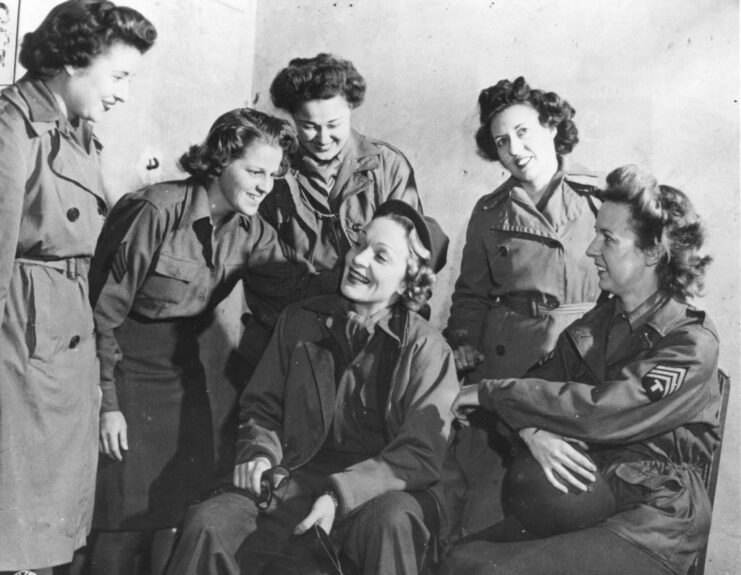
Speaking of the United Service Organizations, one their most popular performers was Marlene Dietrich. She performed across the European Theater, from North Africa and Italy, to France, the Netherlands and the United Kingdom. She even entered her former homeland with Gen. George Patton and James M. Gavin!
Dietrich’s performances primarily involved her performing a comedy routine, singing and dancing, much to the delight of troops. She was also known for her talents with the musical saw, and even brought the “mind reading” trick she’d learned from actor and director Orson Welles to the stage. Her act was among the most popular, with her, at one point, receiving 1,000 letters a day.
Over the course of the Second World War, Dietrich put on an estimated 500 shows, while contending with frostbite and fighting off the flu. When asked why she took to the stage, she simply answered, “Out of decency.” Of the service members she performed in front of, her favorite was the 82nd Airborne Division.
Recruited by the Office of Strategic Services (OSS)
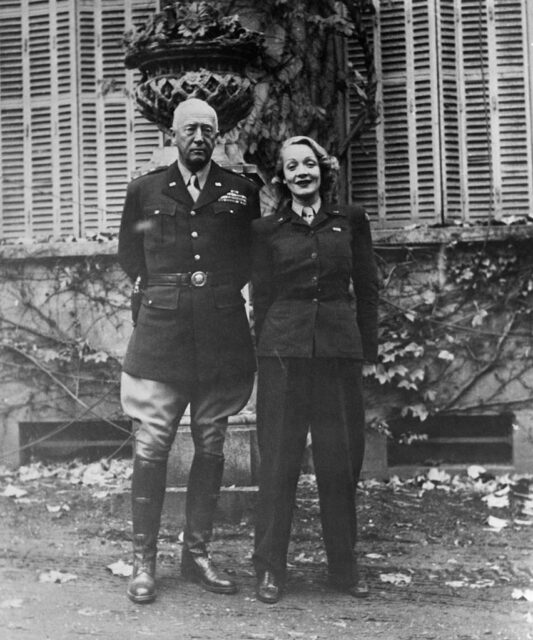
In 1943, Marlene Dietrich was one of the celebrities approached by the Office of Strategic Services (OSS) to participate in the MUZAK Project. Spearheaded by the Morale Operations (MO) Branch, the program aimed to lower morale among the enemy through radio broadcasts that smeared the German regime.
Dietrich rerecorded American songs in German, with her most popular track being “Lili Marlene.” While high-ranking officials in Germany tried to get these so-called “black” radio broadcasts banned, they were met with pushback from troops on the front, who actually petitioned that Dietrich’s music be allowed to air.
Along with singing, the actor also hosted a number of broadcasts, in which she urged the Axis soldiers who were listening to not “sacrifice” themselves, as “the war is crap.” Her efforts and that of others, including Bing Crosby and Dinah Shore, were a major success, with both military personnel and civilians alike beginning to question the propaganda they were fed – the US Strategic Bombing Survey even concluded that “the programs were just a devastating to German morale as an air raid.”
For her efforts with the OSS, Dietrich received a personal thanks from Maj. Gen. William “Wild Bill” Donovan, who said, “I am personally deeply grateful for your generosity in making these recordings for us.”
How else did Marlene Dietrich get involved in the war effort?
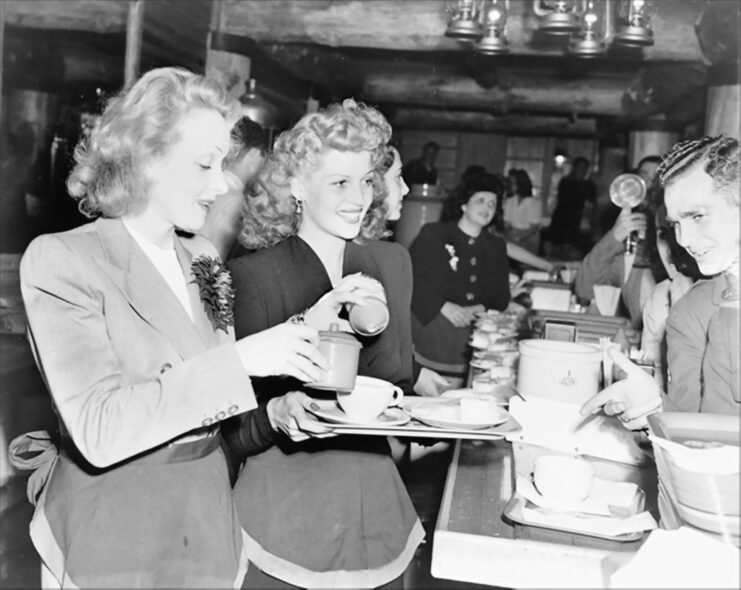
Now, you might be thinking that there’s no way Marlene Dietrich could have done much more to support the war effort, but you’d be wrong. She was a frequent volunteer at the Hollywood Canteen, a club started by Bette Davis and John Garfield to feed troops, and she also made sure to visit injured service members in hospital when overseas.
Dietrich was also very passionate about supporting the Jewish population and German dissidents. Along with filmmaker Billy Wilder, she set up a fund to help Jews escape Germany, donating her $450,000 salary from 1937’s Knight Without Armour to keep it topped up. She also housed German and French exiles, providing them with financial support and advocating on their behalf for American citizenship.
However, all this wasn’t enough for Dietrich. She felt she could be doing more and thus approached fellow actor and US Navy Capt. Douglas Fairbanks, Jr. about a possible assassination plot against the Führer. Dietrich said she would agree to film one movie for the regime, on the condition she was able to be alone with Germany’s leader, at which point she would kill him. She, however, wasn’t sure how to smuggle in the murder weapon, causing the plan to fizzle out before it could be enacted.
More from us: Did You Know the Last Ever US Cavalry Charge Into Combat Occurred in World War II?
Want to become a trivia master? Sign up for our War History Fact of the Day newsletter!
For her dedication to the war effort, Dietrich was awarded a host of honors, including the Presidential Medal of Freedom, which she called her proudest achievement. She also received the French Legion d’Honneur and Belgium’s Knight Order of Leopold.
